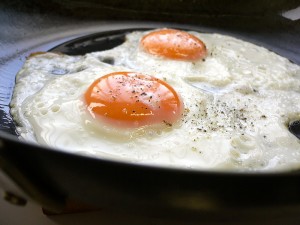 When I saw my eye doctor recently for a potentially serious condition, she recommended that I eat eggs. “Lots of them, especially the yolks.”
When I saw my eye doctor recently for a potentially serious condition, she recommended that I eat eggs. “Lots of them, especially the yolks.”
I laughed, remembering what an elderly friend, now passed away, once told me. Her husband was a physician, and early in their marriage (which would have been about fifty years ago), whenever she was angry at her husband about something, she would prepare herself an egg for breakfast. Consistent with the medical advice at the time, he was certain that eggs were bad for you. So eating one silently was her way of getting back at him.
I’m intrigued by how medical knowledge goes in and out of fashion.
Take milk, for instance. What could be more basic than milk? And yet it goes in and out of favor like the new kid on the block in the eyes of his peers. One decade you’re told you’ll wither away without a glass of milk a day. The next decade you’re warned that overconsumption of calcium through cow’s milk causes osteoporosis.
So how about calcium supplements? For decades, postmenopausal women were instructed by doctors to take calcium supplements to prevent osteoporosis. Now I’m hearing that science says these supplements are harmful to the bones. Today vitamin D is touted as the Savior of bones.
And try to follow the ups and downs of breastfeeding on fortune’s wheel!
When my son was born forty-five years ago, I was instructed not to breastfeed him. I forget why it was considered harmful, but I do remember that one new mother on the maternity ward (who is now my hero) insisted, against all strictures, on breastfeeding her newborn. The nurses scoffed at her and gave her no help.
Times changed. At the start of this century, my daughter-in-law breastfed her babies, just as all mothers were assumed to do if able.
But apparently times have changed again. A fascinating article on motherhood by Diane Johnson in the June 21, 2012 issue of The New York Review of Books reports that while breastfeeding is the norm in the United States, in France it is “viewed as mildly disgusting.”
The same article recounts how parenting methods vary from place to place. Nothing has gone on longer in the human race than parenting; you’d think we’d have figured out how to do it by now. But no.
Johnson paraphrases a new book by Pamela Druckerman, Bringing Up Bébé:
French babies sleep through the night, and French children don’t throw food, because their parents train them to wait for the things they want, even just for five minutes for a hungry infant (“the Pause”), longer for older children, always with an explanation of why the adult can’t instantly gratify the kid’s wishes. [Druckerman] compares this to American parenting theories that teach that infants will feel rejected if they experience an instant of frustration.
I remember my mother telling me that when I was a baby, she was instructed not to hold me too much because it would spoil me. Sounds wacky and cruel and contrary to maternal instinct. But that was the science of the day.
And is there even such a thing as a maternal instinct? This, too, believe it or not, waxes and wanes in the scientific world.
Johnson’s article details some of the scientific controversy currently swirling around the question. Or maybe I should say politically-driven science, because of course much that is claimed as scientific comes from behind-the-scenes power groups. Whether or not milk is proclaimed good for us depends on the current power of the dairy industry.
Among those who insist that a woman’s place is in the home, the maternal instinct is celebrated. Opponents retort that this dictum is a way of oppressing women. I’m astounded that this controversy is back. I’d thought the women’s movement of the 1970s had settled it—in favor of a woman’s place being wherever she personally decided it should be.
Then there’s the pharmaceutical industry’s influence on medical fact. When Fosamax, for instance, was developed by Pharma as treatment for osteoporosis and marketed heavily to doctors, suddenly all postmenopausal women were diagnosed with… osteoporosis!
I’m going to make myself an egg for breakfast tomorrow. But will it be with a glass of milk? I’m stymied.











